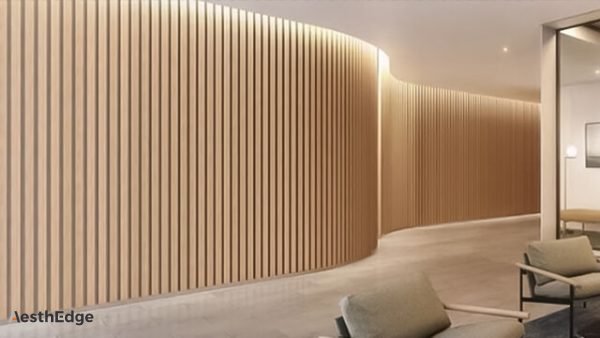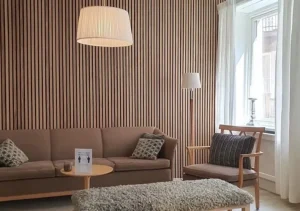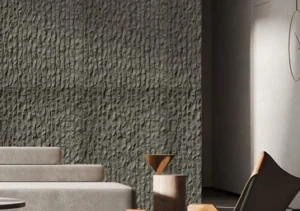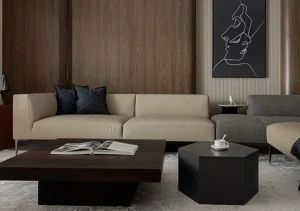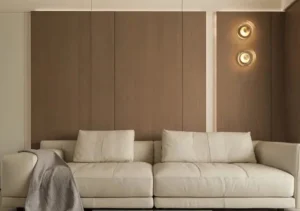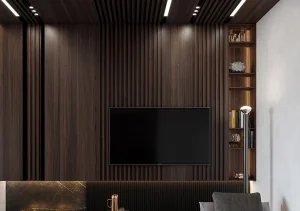PVC marble sheets, also known as PVC marble panels or PVC faux marble sheets, are widely used in modern interior decoration due to their realistic marble-like appearance, lightweight nature, cost-effectiveness, and environmental friendliness. These decorative panels are commonly applied to walls, ceilings, columns, furniture surfaces, and commercial interiors.
To meet diverse aesthetic and functional demands, manufacturers have developed multiple surface treatment methods for PVC marble sheets. Each method enhances specific characteristics such as texture, glossiness, wear resistance, or tactile feel. Understanding these surface treatments is critical for B2B buyers, architects, and contractors who are looking for the right decorative material for their project.
In this article, we will explore the major surface treatment techniques used for PVC marble sheets, analyze their benefits, compare their properties, and examine how to choose the right treatment for different applications.
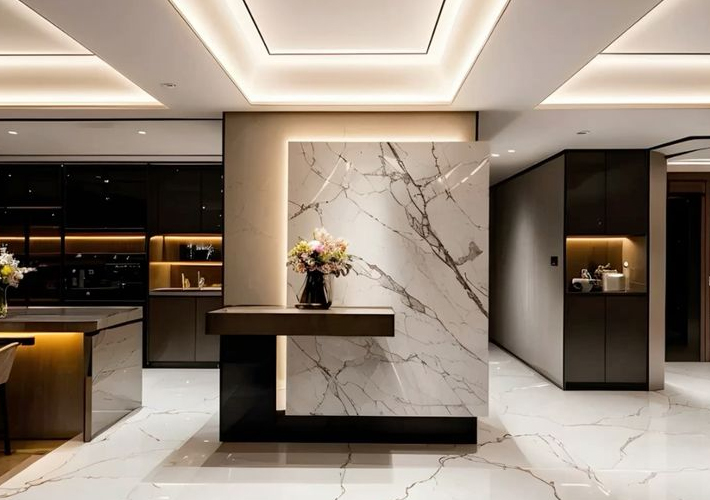
Table of Contents
TogglePrinting Technology Base: UV Printing and Transfer Printing
1.1 UV Printing (Ultra-Violet Printing)
UV printing is one of the most commonly used technologies in the PVC marble sheet industry. It involves printing the marble texture directly onto the surface of the PVC sheet using UV-curable inks and drying them instantly under ultraviolet light.
Advantages:
- High color saturation and realism
- Excellent resolution, mimicking natural stone veins
- Instant drying reduces production time
- Can be overprinted for 3D or embossed effects
Applications:
- High-end commercial interiors
- Hotel lobbies and luxury residential projects
1.2 Heat Transfer Printing
This method uses a transfer film with marble patterns, which is heated and pressed onto the PVC board’s surface. The pattern is then transferred onto the sheet.
Advantages:
- Smooth surface finish
- Cost-effective for mass production
- Suitable for standard marble designs
Limitations:
- Slightly lower durability compared to UV printing
- Limited to 2D flat designs
UV Coating Surface Treatment
Once the pattern is printed, a UV coating is often applied on the surface to enhance wear resistance, gloss, and protection. This can include:
2.1 High-Gloss UV Coating
A high-gloss finish reflects light and gives the PVC marble sheet a luxurious, mirror-like surface. It is achieved through UV-curable acrylic resins.
Advantages:
- Elegant look, ideal for upscale spaces
- Easy to clean
- Resistant to stains and water
Disadvantages:
- More prone to fingerprint marks
- Not ideal for areas that require a matte finish
Applications:
- Hotel reception areas
- Decorative feature walls in luxury homes
2.2 Matte UV Coating
This finish offers a smooth, non-reflective surface and a soft visual appeal.
Advantages:
- Reduces glare
- More natural stone-like appearance
- Resistant to scratches
Applications:
- Offices, clinics, libraries
- Public places where subtlety is preferred
2.3 Semi-Matte (Satin) Finish
Between gloss and matte, this finish provides a slight sheen, offering both elegance and practicality.
Applications:
- Retail stores
- Medium-end interior decoration projects
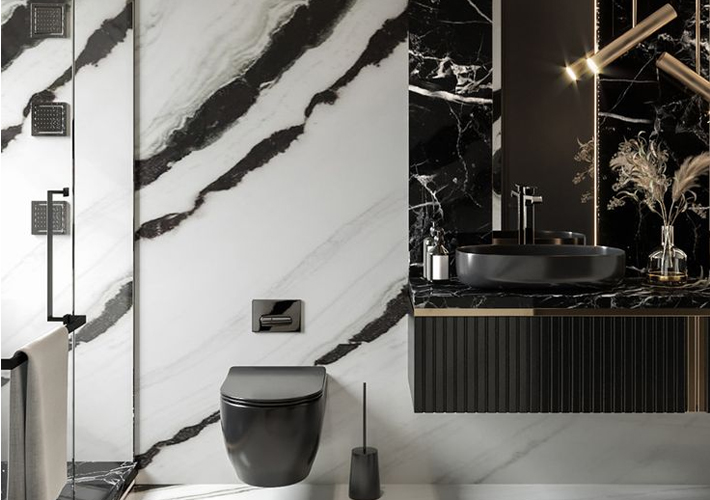
Embossing Treatment (3D Surface Texture)
Embossing technology adds a physical texture to the surface of PVC marble sheets, creating a tactile and visual effect that mimics real stone grains.
3.1 Hot Press Embossing
Using a steel roller or mold, the sheet is pressed at high temperatures to create a texture.
Advantages:
- Enhanced realism and tactile quality
- Improves visual depth
Applications:
- Interior walls
- Columns and furniture surfaces
3.2 Cold Embossing
This method uses a mechanical press at room temperature and is usually combined with UV coating or lamination.
Advantages:
- Lower energy cost
- Suitable for lighter textures
Lamination Surface Treatment
Lamination involves covering the printed PVC marble surface with a transparent protective film, which can have various surface textures and gloss levels.
4.1 Glossy Lamination
A plastic film with high gloss is laminated over the printed sheet.
Advantages:
- Protects against scratches and moisture
- Enhances color brilliance
4.2 Matte Lamination
A matte plastic film is used for a soft, non-reflective finish.
Advantages:
- Better for subtle decoration styles
- Hides fingerprints and surface defects
4.3 Textured Lamination
Films with specific textures (such as sand, stone, or wood feel) are laminated to offer unique tactile effects.
Applications:
- Custom furniture
- Decorative paneling in themed spaces
Anti-Scratch and Anti-Fingerprint Treatment
In high-traffic environments or areas where cleanliness is essential, special treatments are used to improve durability and cleanliness.
5.1 Anti-Scratch Coating
A harder UV layer or nano-coating is added to protect the surface from abrasions.
Applications:
- Public corridors
- Restaurants and cafes
5.2 Anti-Fingerprint Coating
Especially on matte or satin finishes, a special nano layer is applied to resist smudges and fingerprints.
Applications:
- Touch-intensive areas like elevator walls or kitchen backsplashes
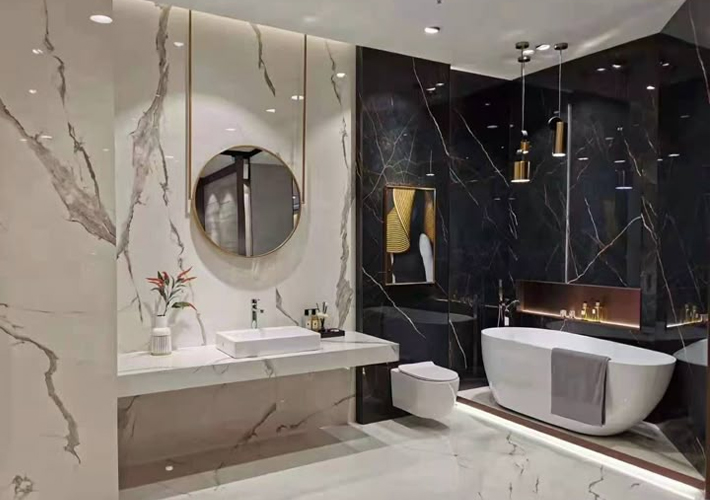
Fireproof and Antibacterial Coatings
Some PVC marble sheets are treated with additional layers to enhance their performance in specific environments.
6.1 Fire-Resistant Surface Layer
Treated with flame-retardant additives or coatings to meet Class B or higher fire safety standards.
Applications:
- Public facilities
- Transportation hubs
6.2 Antibacterial Surface Coating
A silver-ion or nano-antibacterial layer is added to inhibit microbial growth.
Applications:
- Hospitals
- Public restrooms
- Schools
Special Effects Finishing
Manufacturers are now pushing innovation by offering PVC marble sheets with special visual or tactile effects, including:
7.1 Mirror Finish
Achieved through multiple high-gloss UV layers and polishing.
Applications:
- Fashion stores
- Showrooms
7.2 Metallic Gloss Effect
Added metallic pigments or layers give a reflective, metallic shimmer.
Applications:
- Bars, nightclubs, and premium interiors
7.3 Glitter or Pearl Finish
Small reflective particles embedded in the top layer create a sparkling effect.
Applications:
- Children’s areas
- Themed commercial spaces
Comparison Table of Surface Treatment Methods
| Method | Gloss Options | Durability | Tactile Texture | Cost | Typical Applications |
|---|---|---|---|---|---|
| UV Printing + UV Coating | High, matte, satin | High | Optional embossing | Medium | Hotels, showrooms |
| Heat Transfer Printing | Gloss, matte | Medium | Smooth | Low | Standard wall applications |
| Embossing | Varies | High | Strong | Medium | High-end interiors |
| Lamination | Gloss, matte, texture | Medium | Varies | Low | Furniture, panels |
| Anti-scratch/Fingerprint | Mostly matte/satin | Very High | Smooth | Medium | Kitchens, elevators |
| Special Effects (Mirror, Metallic) | High | Medium | Smooth | High | Commercial design areas |
How to Choose the Right Surface Treatment?
When selecting PVC marble sheets for your project, consider the following factors:
Application Environment
- High-traffic areas: Use anti-scratch and anti-fingerprint coatings.
- Moist areas: Go for laminated or UV-coated waterproof surfaces.
Aesthetic Preferences
- Luxury feel: Choose high-gloss or mirror finishes.
- Natural elegance: Use matte or satin finishes with embossing.
Functional Requirements
- Fire safety: Require fire-resistant coatings.
- Hygiene: Antibacterial coatings are ideal for hospitals or schools.
Budget
- Standard lamination and transfer printing are budget-friendly.
- UV printing and special effects finishes are suitable for premium projects.
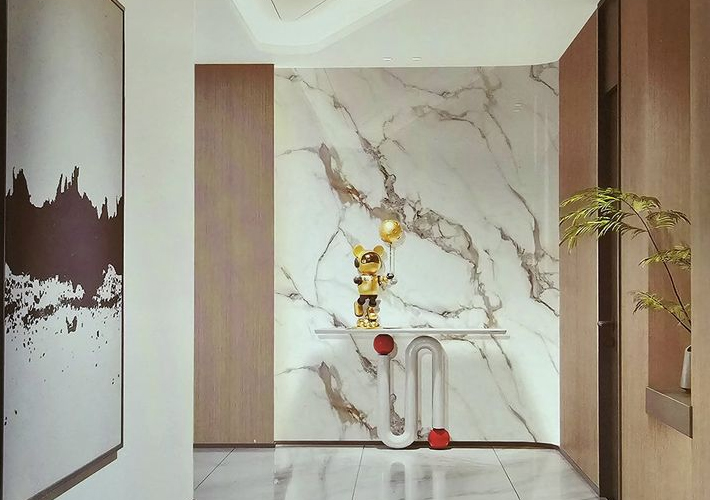
Market Trends and Innovations
As the demand for sustainable and visually stunning materials increases, surface treatments for PVC marble sheets continue to evolve. Some current trends include:
- Nano-coating technologies for ultra-durability
- Eco-friendly coatings with lower VOC emissions
- Digital printing advancements for more realistic textures
- Modular customization, allowing clients to specify gloss, texture, and finish combinations
These innovations are shaping a new generation of decorative wall panels that offer both beauty and performance.
Conclusion
There are at least seven major surface treatment methods for PVC marble sheets, each offering unique aesthetic and functional benefits. From high-gloss UV finishes to tactile embossed textures and anti-fingerprint coatings, surface treatment technology significantly impacts the final look, feel, and performance of the product.
Understanding these options allows architects, builders, wholesalers, and designers to make informed decisions based on project needs, budget, and customer expectations. As a B2B manufacturer or supplier, offering a wide range of surface finishes not only adds product value but also enhances competitiveness in both domestic and international markets.
Whether you’re working on a luxury hotel lobby or a functional office wall, choosing the right surface treatment can elevate your PVC marble sheet project to the next level.

